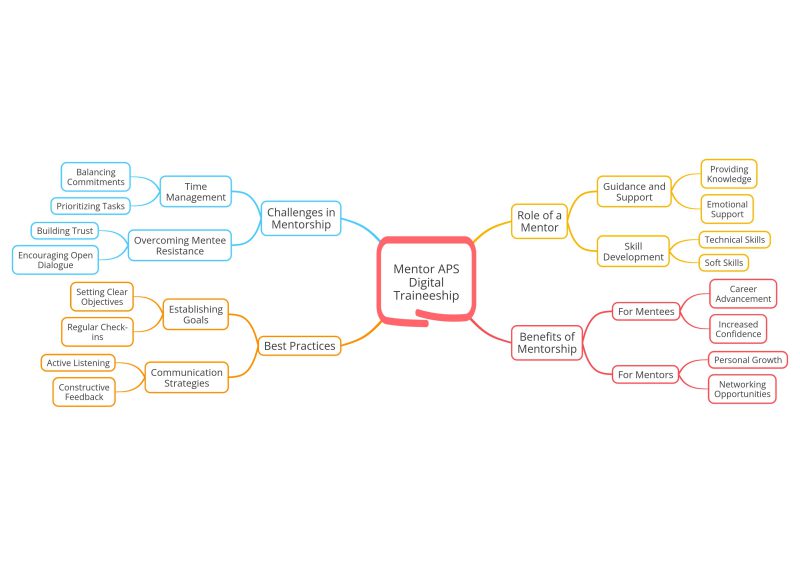Being a Mentor
Being a Mentor
Being a Mentor in the APS Digital Traineeship Program
Mentoring in the Australian Public Service (APS), particularly within the Digital Traineeship Program, is a structured and rewarding professional development relationship. It connects experienced public sector professionals with early-career IT trainees who are eager to learn and grow in their APS roles.
While the focus is often on the mentee’s development, mentoring is a two-way street. Mentors also gain fresh perspectives, hone leadership and communication skills, and contribute meaningfully to the future of Australia’s digital workforce.
The Role of an APS IT Mentor
Mentoring in the APS is underpinned by respect, trust, and integrity, and goes beyond casual career advice. It plays a critical role in shaping emerging digital professionals and fostering an inclusive, future-ready public sector.
A mentor can be:
An advisor – offering insights based on real APS experiences
A teacher – sharing technical skills, public sector processes, and knowledge of digital tools
A guide – helping mentees set and reach realistic career goals
A supporter – encouraging confidence during challenges
A role model – demonstrating professionalism and APS values
A networker – introducing mentees to relevant communities and stakeholders
A challenger – encouraging critical thinking and innovative problem-solving
A mentor is not:
A line manager or performance reviewer
A therapist or counsellor (refer to EAP or agency HR)
Responsible for resolving workplace conflicts (this lies with the mentee’s supervisor)
Key Qualities of Effective APS Mentors
To support IT trainees effectively, mentors should demonstrate the following traits:
Active listening – tuning into both verbal and non-verbal communication
Honesty with empathy – delivering constructive feedback kindly but clearly
Curiosity – asking thoughtful questions to guide reflection and learning
Humility – recognising they don’t have all the answers
Commitment – showing up consistently and being present in the relationship
Passion for the public good – inspiring mentees with a vision for impactful work in government
Structure of the APS Mentorship Relationship
The APS Digital Traineeship Program offers a 12-session framework over approximately 12 months, designed to provide both structure and flexibility. Key phases include:
1. Initiation & Expectation Setting
Build rapport and trust
Discuss preferred communication styles
Establish goals and expectations
Sign a mentoring agreement
2. Goal Planning & Development
Identify career aspirations
Collaboratively complete an Individual Learning Plan (ILP)
Set SMART goals (Specific, Measurable, Achievable, Relevant, Time-bound)
3. Regular Meetings & Review
Monthly or fortnightly catch-ups
Discuss wins, challenges, current digital trends, and skills gaps
Adjust the ILP as needed
4. Feedback & Reflection
Mid-program feedback using tools like a SWOT analysis
Celebrate progress and review goals
Provide honest but respectful evaluations
5. Forward Planning & Closure
Explore APS career opportunities using tools like the APS Career Pathfinder
Celebrate program achievements
Redefine the mentor-mentee relationship post-program
Tips for a Successful APS Mentorship
Customise your approach – each trainee may need a different style of mentoring
Use real-world scenarios – frame advice within APS contexts
Encourage independence – guide mentees towards self-discovery and problem-solving
Maintain confidentiality – especially around workplace experiences and aspirations
Be realistic about your capacity – don’t overcommit; set healthy boundaries
Challenges to Watch For
Even the most enthusiastic mentors can face hurdles, such as:
Mismatched expectations
Mentees becoming overly reliant
Difficulty managing time with other APS commitments
Emotional fatigue or burnout
Being proactive in setting boundaries, providing structure, and referring mentees to appropriate resources can mitigate these risks.
Benefits for APS Mentors
Mentoring within the APS isn’t just about giving—it’s about growing.
Benefits include:
Enhanced leadership and communication skills
Exposure to new ideas and technologies
A renewed sense of purpose and connection to the APS mission
Recognition as a contributor to public sector capability
As one mentor put it, “A candle loses nothing of its light by lighting another.”
Final Thoughts
By mentoring an IT trainee, you’re not just helping one person—you’re shaping the digital future of the Australian Government. This is your opportunity to pass on your experience, empower the next generation of public servants, and foster a culture of learning and collaboration across the APS.
Thank you for making the time and space to share your expertise. Your impact is lasting.


